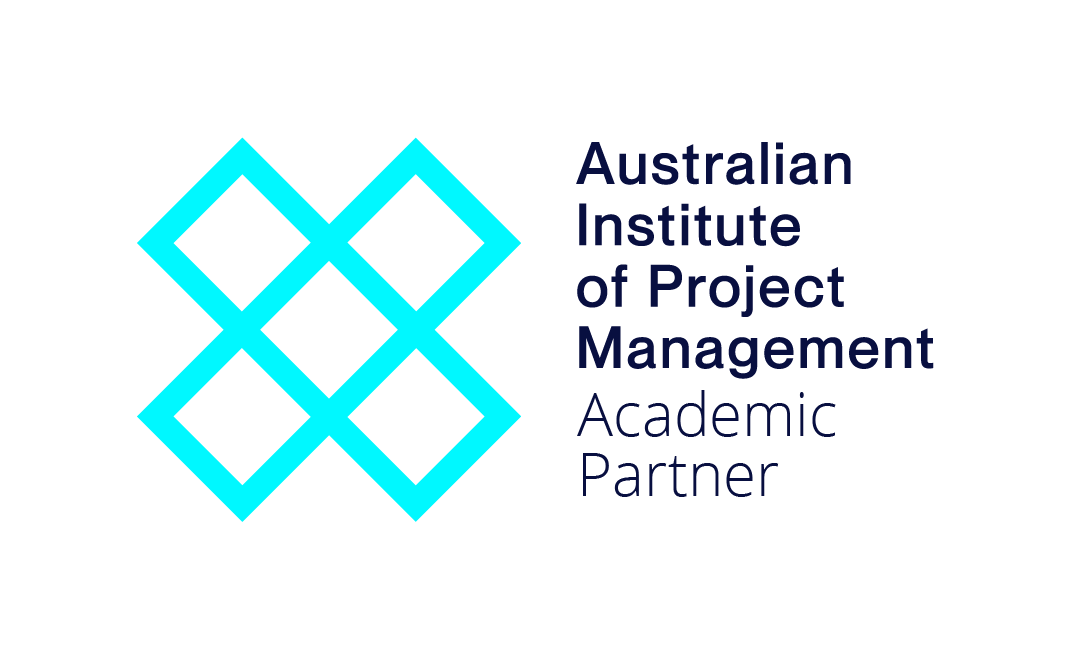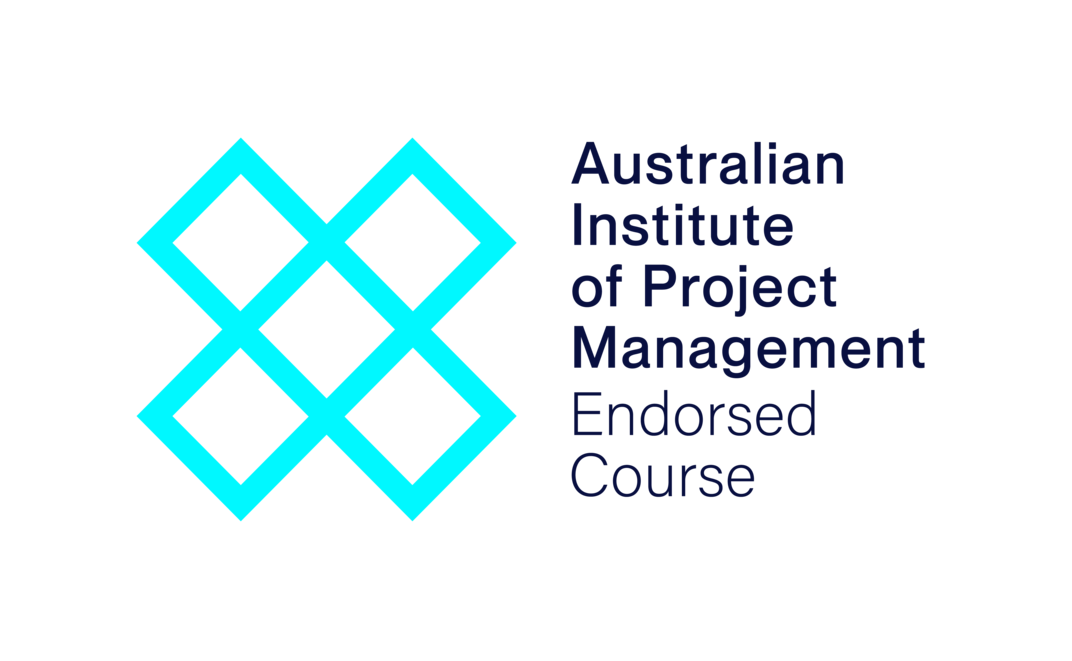Course Overview
The objective of the Graduate Diploma of Project Management is to develop students and practitioners with the skills and knowledge to assume roles in the planning, delivery of complex projects in a range of industry settings. It will also embed the concepts of sustainability as a dimension of managerial decisions and processes. Project Managers need to think strategically and demonstrate mastery of managerial perspectives that can optimise the project value and aid the achievement of triple objectives of economic, performance, and environment. The focus in our course is to study projects within a comprehensive framework. We apply an integrated project and business development approach that emphasises the delivery of the project business case and achievement of triple objectives.
The course curriculum and learning framework are based on the standards outlined in the Project Management Body of Knowledge (PMBOK® Guide) and endorsed by the Australian Institute of Project Management (AIPM).
Course Structure
To qualify for the award, students are required to successfully complete the seven (7) core units listed below, plus one (1) elective from the provided options. This totals to 8 units which is equivalent to 64 credit points.
Core Units
| Unit Code and Title | Credit Points* | Pre-requisite(s) |
|---|---|---|
| PRJ5001 Project Management Profession | 8 | Nil |
| PRJ5002 Enterprise and Resource Planning | 8 | Nil |
| PRJ5003 Project Constraint Management | 8 | Nil |
| PRJ5004 Procurement, Quality and Risk Management | 8 | Nil |
| PRJ5108 Project Delivery and Procurement | 8 | PRJ5001 Project Management Profession |
| PRJ5105 Project Integration and Change Management | 8 | PRJ5001 Project Management Profession |
| PRJ5106 Research Methodology and Data Analysis | 8 | Completion of 24 credit points |
*A unit worth 8 credit points is equal to 0.167 Equivalent Full-Time Student Load (EFTSL).
Elective Units
Select any one (1) elective from the options below. Recommended electives are denoted by (^).
| Unit Code and Title | Credit Points* | Pre-requisite(s) |
|---|---|---|
| PRJ5107 Venture, Project Economics and Finance^ | 8 | PRJ5001 Project Management Profession |
| BUS6001 Business Strategy Management^ | 8 | Nil |
| PRJ6002 Strategic Portfolio Management | 8 | BUS6001 Business Strategy Management |
| BUS6002 Enterprise Operations Management | 8 | Nil |
| BUS6003 Business Law | 8 | Nil |
| BUS6004 Enterprise Information Systems | 8 | PRJ5002 Enterprise and Resource Planning |
| BUS6005 International Business | 8 | Nil |
*A unit worth 8 credit points is equal to 0.167 Equivalent Full-Time Student Load (EFTSL).
| Compulsory Units | Credit Points/EFTSL |
|---|---|
| PRJ5001 – Project Management Profession | 8/0.167 |
| PRJ5002 – Enterprise and Resource Planning | 8/0.167 |
| PRJ5003 – Project Constraint Management | 8/0.167 |
| PRJ5004 – Procurement, Quality and Risk Management | 8/0.167 |
| PRJ5108 – Project Delivery and Procurement | 8/0.167 |
| PRJ5105 – Project Integration and Change Management | 8/0.167 |
| PRJ5106 – Research Methodology and Data Analysis Elective | 8/0.167 |
| Recommended Electives | Credit Points/EFTSL |
|---|---|
| PRJ5107 – Venture, Project Economics and Finance | 8/0.167 |
| BUS6001 – Business Strategy Management | 8/0.167 |
| General Electives | Credit Points/EFTSL |
|---|---|
| PRJ6002 – Strategic Portfolio Management | 8/0.167 |
| BUS6002 – Enterprise Business Management | 8/0.167 |
| BUS6003 – Business Law | 8/0.167 |
| BUS6004 – Enterprise Information Systems | 8/0.167 |
| BUS6005 – International Business | 8/0.167 |
| BUS5001 – Ethical Legal and Industrial Frameworks | 8/0.167 |
| BUS5002 – Applied Accounting and Financial Management | 8/0.167 |
| BUS5003 – Information Systems and Data Analysis | 8/0.167 |
| BUS5004 – Leadership and Influence | 8/0.167 |
| Units | Prerequisites |
|---|---|
| PRJ5108 Project Delivery and Procurement | PRJ5001 – Project Management Profession |
| PRJ5105 Project Integration and Change Management | One of the following: PRJ5001 – Project Management Profession, or PRJ5002 – Enterprise and Resource Planning, or PRJ5003 – Project Constraint Management, or PRJ5004 – Procurement, Quality and Risk Management + completion of 16 credit points. |
| PRJ5106 Research Methodology and Data Analysis | Completion of 24 Credit Points |
| PRJ5107 Venture, Project Economics and Finance | PRJ5001 – Project Management Profession |
| PRJ6002 Strategic Portfolio Management | BUS6001 – Business Strategy Management |
| BUS6004 Enterprise Information Systems | PRJ5002 – Enterprise and Resource Planning |
Admission Requirements
-
Entry Requirements
-
English Language Requirements(For International Students)
-
FEE-HELP(For Domestic Students)
The following academic admission criteria apply to all applicants to courses at APIC that lead to the award of a Graduate Diploma qualification. Additional English language requirements for international students are provided in the next tab.
Admission will be granted to applicants who meet any ONE of the following criteria:
- Successfully completed a Bachelor’s degree (AQF 7) or higher awarded by a recognised university or higher education institution or its international equivalent, in any discipline; OR
- successfully completed an Associate Degree or Advanced Diploma (AQF 6) awarded by a recognised university or higher education institution or its international equivalent, in any discipline, AND have at least two- years full-time managerial and/or professional work experience in a related field; OR
- successfully completed a postgraduate preparation program; OR
- a minimum of three-years full-time managerial and/or professional work experience in a related field; OR
- a minimum of five-years full-time general work experience in a related field.
For more information on admission requirements including special entry requirements, please refer to the APIC Admission Policy.
All applicants from a non-English speaking background applying to a Master or Graduate Diploma course at APIC must satisfy ONE of the following English language requirements:
- IELTS Academic: overall band score of 6.5 or higher, with a minimum score of 6.0 in writing and speaking; OR
- IBT (Internet-based TOEFL): Overall score of 79 with a writing section minimum of 21 and speaking 18; OR
- Cambridge Certificate of Proficiency in English (CPE): Overall score 180, writing and speaking 180; OR
- Cambridge Certificate of Advanced English (CAE): Overall 176 with a writing and speaking minimum score of 169: OR
- PTE Academic Module with a minimum score of 58 with a writing and speaking section minimum of 50.
FEE-HELP is a Commonwealth Government loan available to eligible students enrolled in APIC Courses in order to help pay all or part of their tuition fees.
FEE-HELP is available for all Units of Study for eligible students.
Details about HELP loans including eligibility requirements and repayment of a HELP debt can be found here.
The current FEE-HELP Information Booklet can be downloaded here.
If you have any questions about applying for FEE-HELP please contact us at: [email protected]
Course Learning Outcomes
- Advanced knowledge of the theories, concepts, principles, and key applied technologies, including information technology, needed for effective leadership, strategic operation and project management, and of key professional, ethical, industrial, and legislative codes and regulations.
- Cognitive skills to review, analyse, consolidate and synthesise knowledge from a range of industry and academic sources to provide solutions to problems in domains such as customer service, resource management, risk management, organisational methods, and implementation of new technologies and processes.
- Cognitive skills to think critically, to evaluate new, dynamic, and complex project management risks and resources management requirements, and generate solutions to complex problems.
- Specialised technical skills in project planning, project budgeting, preparing project timelines, and resource management required for specific projects.
- Communication skills to clearly articulate complex concepts and solutions relating to the analysis, planning, design, and evaluation of approaches to customer service, resource management, risk management, organisational methods, and implementation of new technologies and processes.
- Skills for clearly explaining complex knowledge and ideas relating to analysis, planning, design, and evaluation of appropriate to customer service, resource management, risk management, organisational methods, and implementation of new technologies and processes to various audiences, client, project teams and professionals.
- Make high-level judgement concerning a range of technical and management functions in contexts including implementation of new finance structure, customer service models, strategy, and acquisition techniques.
- Initiate, plan, implement and evaluate broad functions of project management within a range of contexts, including resource management, information technology, procurement, new product development, and service development.
- Demonstrate responsibility, accountability, and ethical professional practice across all functional areas, including research. Analysis, planning, implementation, review, and performance management, both within a team and when working autonomously.
- Work effectively in diverse teams to deliver outcomes, both as team members and as team leaders, as appropriate to the context.
Accreditation
- APIC courses are nationally accredited and registered by the Tertiary Education Quality and Standards Agency (TEQSA) and included in the National Register of Higher Education Providers.
- APIC is formally registered on the Commonwealth Register of Institutions and Courses for Overseas Students (CRICOS). GradDipPM CRICOS Code is 066177G
- APIC’s Graduate Diploma of Project Management is endorsed by the Australian Institute of Project Management.


Skill Development
In this course, you should expect to develop the following attributes:
- Basic project management knowledge and tools
- Leadership and communication
- Problem solving
- Creativity and lateral thinking
- Ethics and sustainability
Career Outcomes
Possible Employment:
- Construction Project Administrator
- ICT Project Manager
- Healthcare Project Administrator
- Engineering Project Administrator
- Project Lead
- Project Team Lead
- Project Administrator
- Project Planner
- Project Coordinator
Career Outcomes
Healthcare Project Administrator
Engineering Project Administrator
Project Lead
Project Team Lead
Project Administrator
Project Planner
Project Coordinator



